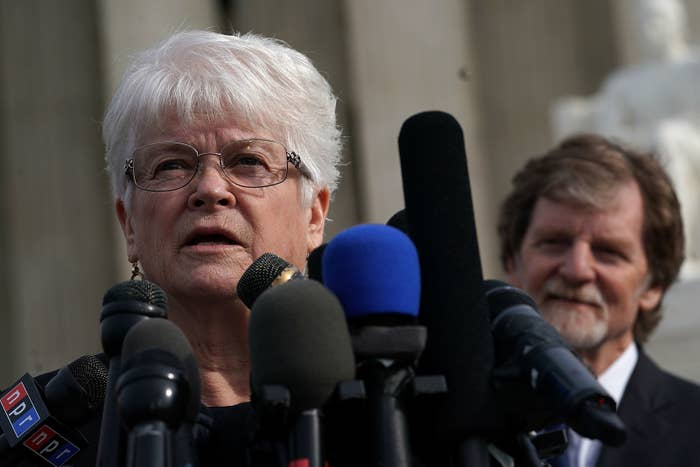
The Supreme Court on Monday breathed life back into the case of a Christian florist who refused to serve a gay couple that wanted a wedding arrangement. In doing so, the court fueled an emerging debate about whether state officials give fair hearings to religious people who try to sidestep nondiscrimination laws.
The Supreme Court’s order sent Barronelle Stutzman’s case back to the Washington state Supreme Court — saying that the previous ruling against her must be reconsidered in light of another Supreme Court ruling earlier this month.
In that recent case, Masterpiece Cakeshop v. Colorado Civil Rights Commission, the high court found commissioners had shown an impermissible "hostility" to the religious views of a Christian baker who turned away a gay couple. The Supreme Court ruled for the baker on those narrow grounds, avoiding the larger question of whether the baker could be exempted from nondiscrimination laws because of those religious beliefs.
Stutzman’s lawyers at the Alliance Defending Freedom — who also represented the baker — contend Washington state officials were similarly hostile to Stutzman’s religious views. As such, they say, her previous defeat should be overturned as well.
But while the Alliance Defending Freedom trumpeted the baker’s case as a victory, the decision has already proven to be a double-edged sword. An Arizona appeals court cited the Masterpiece case to rule against another business that sought to refuse service for same-sex weddings. The court, citing the baker’s ruling, said gay people may also be free of discrimination.
The Supreme Court could have agreed to hear Stutzman's case itself, potentially resolving the bigger question of whether First Amendment rights to free expression and religious exercise allow religious objectors to skirt civil rights laws when creating custom products. Instead, justices punted to the lower court on Monday.
Now, Alliance Defending Freedom hopes to chart new ground by focusing on the “hostility” basis of the Supreme Court's baker ruling — arguing that the state attorney general was overly zealous.
“The attorney general has relentlessly prosecuted me, even suing me in my personal capacity," said a statement from Stutzman earlier this month, foreshadowing a likely argument as the case proceeds.
"For him, this case has been about making an example of me — crushing me — all because he disapproves of what I believe about marriage,” she said.
Kristen Waggoner, Stutzman’s lawyer at Alliance Defending Freedom (and the baker’s lawyer at the Supreme Court), echoed that argument in a recent phone call.
Waggoner said Bob Ferguson, attorney general for Washington state, showed hostility by seeking personal damages from Stutzman and bypassing the state's civil rights commission.
Ferguson has attempted "unprecedented measures to punish” Stutzman, while failing to prosecute a business that discriminated against Christian customers, Waggoner said this month in a statement. She added that Ferguson "repeatedly and overtly demeaned” Stutzman in legal briefs, and compared her religious beliefs about marriage to racial discrimination. "This conflicts with the Supreme Court’s recognition in Masterpiece Cakeshop that it was 'inappropriate' for the government to draw parallels between those religious beliefs and ‘defenses of slavery.’"
But Ferguson only sought $1 in fees and "a modest $1,000 penalty,” he rebutted in early June. "We are confident Washington courts showed no such hostility" like that cited by the Supreme Court in the baker’s case, he said.
Ferguson played down the Supreme Court’s order on Monday.
“We expected this procedural step,” he said in a statement. “The Washington State Supreme Court now has the job of determining whether the U.S. Supreme Court ruling affects this case. I am confident they will come to the same conclusion they did in their previous, unanimous ruling upholding the civil rights of same-sex couples in our state.”
Alliance Defending Freedom is also pursuing cases in Arizona and Colorado that could bring the underlying legal questions back to the Supreme Court.
